|
|
|
Sort Order |
|
|
|
Items / Page
|
|
|
|
|
|
|
| Srl | Item |
| 1 |
ID:
109594
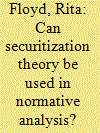

|
|
|
|
|
| Publication |
2011.
|
| Summary/Abstract |
While securitization studies have paid considerable attention to the moral value of desecuritization, they have paid almost no attention to the morality of securitization. In this article, I attempt to rectify that situation by proposing a revision of securitization theory that specifies three criteria that - if fulfilled at the same time - would render a securitization morally right. The criteria are: (1) that there is an objective existential threat; (2) that the referent object of security is morally legitimate; and (3) that the security response is appropriate to the threat in question. Although what is suggested here is considerably removed from the Copenhagen School's original securitization theory, it is akin to that framework insofar as it retains the functional distinction between the security analyst and the securitizing actor. Indeed, the development of criteria that determine the moral rightness of securitization is analogous to the Copenhagen School's devising criteria that determine both the existence and the success of securitization.
|
|
|
|
|
|
|
|
|
|
|
|
|
|
|
|
| 2 |
ID:
109586
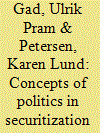

|
|
|
|
|
| Publication |
2011.
|
| Summary/Abstract |
The article argues that there are a number of concepts of politics in play in the current debates on securitization theory and that greater awareness regarding these conceptual differences helps clarify not only theoretical differences but also the possibilities for new theoretical development and reflection. The article identifies three conversations on politics: first, a conversation on how politics concerns action and intentionality; second, a conversation on the modern organization of politics, spheres and sectors; and, third, a conversation on the relationship between politics, ethics and science. Where the first and third conversations refer to politics as an act, in the second conversation politics is inherently tied to the institutional or spatial structures of government - the state, the public, the political field, spheres, sectors or function.
|
|
|
|
|
|
|
|
|
|
|
|
|
|
|
|
| 3 |
ID:
109595
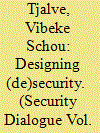

|
|
|
|
|
| Publication |
2011.
|
| Summary/Abstract |
This article pursues three interrelated objectives. Above all, it seeks to theorize desecuritization at the level of polity rather than policy; to distinguish between forms of political order and the likelihood that they will give in to the call for exceptional measures. Second, and to achieve that goal, it suggests a turn away from continental notions of 'the people' and towards American debates over 'the public sphere': a realm deliberately designed and continually cultivated to exercise autonomous, pluralistic and politicized contestation. Third, it examines why the 'speechlessness' of contemporary Western security practices may inhibit that public sphere from functioning properly.
|
|
|
|
|
|
|
|
|
|
|
|
|
|
|
|
| 4 |
ID:
109589
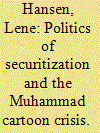

|
|
|
|
|
| Publication |
2011.
|
| Summary/Abstract |
A broad array of authors and schools have influenced Barry Buzan and Ole Wæver's formulation of securitization theory, including John L. Austin, Jacques Derrida and Carl Schmitt. This article draws attention to and strengthens the post-structuralist elements in the writings of Buzan and Wæver, as this part of the theory has received less attention than those attributable to Schmitt and Austin. Starting from securitization theory as developed by Buzan and Wæver and engaging with later expansions of the theory, I suggest a post-structuralist framework built around three questions: Through which discursive structures are cases and phenomena represented and incorporated into a larger discursive field? What is the epistemic terrain through which phenomena are known? And, what are the substantial modalities that define what kind of an issue a security problem is? The last part of the article brings this framework to bear on the 'Muhammad cartoon crisis' that began with the publication of 12 cartoons depicting the Prophet Muhammad in the Danish newspaper Jyllands-Posten in 2005.
|
|
|
|
|
|
|
|
|
|
|
|
|
|
|
|
| 5 |
ID:
109592
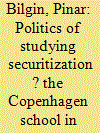

|
|
|
|
|
| Publication |
2011.
|
| Summary/Abstract |
Copenhagen School securitization theory has made significant inroads into the study of security in Western Europe. In recent years, it has also begun to gain a presence elsewhere. This is somewhat unanticipated. Given the worldwide prevalence of mainstream approaches to security, the nature of peripheral international relations, and the Western European origins and focus of the theory, there is no obvious reason to expect securitization theory to have a significant presence outside Western Europe. Adopting a reflexive notion of theory allows, the article argues, inquiry into the politics of studying security, which in turn reveals how the Western European origins and focus of securitization theory may be a factor enhancing its potential for adoption by others depending on the historico-political context. Focusing on the case of Turkey, the article locates the security literature of that country in the context of debates on accession to the European Union and highlights how securitization theory is utilized by Turkey's authors as a 'Western European approach' to security.
|
|
|
|
|
|
|
|
|
|
|
|
|
|
|
|
| 6 |
ID:
109597
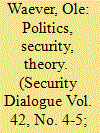

|
|
|
|
|
| Publication |
2011.
|
| Summary/Abstract |
This article outlines three ways of analysing the 'politics of securitization', emphasizing an often-overlooked form of politics practised through theory design. The structure and nature of a theory can have systematic political implications. Analysis of this 'politics of securitization' is distinct from both the study of political practices of securitization and explorations of competing concepts of politics among security theories. It means tracking what kinds of analysis the theory can produce and whether such analysis systematically impacts real-life political struggles. Securitization theory is found to 'act politically' through three structural features that systematically shape the political effects of using the theory. The article further discusses - on the basis of the preceding articles in the special issue - three emerging debates around securitization theory: ethics, transformations and post-Western analyses. The article finally suggests one possible way forward for securitization theory: a route built on first clarifying its concept of theory, then specifying more clearly the place of political theory and causal mechanisms in different parts of the analysis. The politics of securitization accordingly becomes sharpened. Instead of deducing the political quality of the theory from various empirical statements by its proponents, this approach zooms in on the very core of the theory: how does it structurally condition work done with it in systematically political ways?
|
|
|
|
|
|
|
|
|
|
|
|
|
|
|
|
| 7 |
ID:
109591
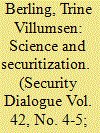

|
|
|
|
|
| Publication |
2011.
|
| Summary/Abstract |
The interface between science and securitization has not been systematically addressed. This article argues from a Bourdieusian viewpoint that scientific arguments and 'facts' are at work in at least three distinct mechanisms within and around securitization. First, science communities/explanations can come to objectify an issue to the extent where securitization - and even politicization - becomes next to impossible. Second, science co-determines the status of a securitizing actor and thus influences the authority of the speaker in specific fields. Third, scientific facts can be mobilized in securitization claims by securitizing actors in attempts to seek back-up in the objective, disinterested aura of the scientific vocation. The RAND Corporation's objectivation of the issue of nuclear deterrence is taken as an example of the first mechanism, while climate change and democratic peace illustrate the other two mechanisms. The article questions whether securitization theory has adequately addressed the issue of context, points to a new research agenda and carves out practical reflexivity for security experts.
|
|
|
|
|
|
|
|
|
|
|
|
|
|
|
|
| 8 |
ID:
109596
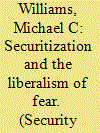

|
|
|
|
|
| Publication |
2011.
|
| Summary/Abstract |
This article seeks to extend securitization theory conceptually and, to a lesser degree, empirically by further developing the relationship between securitization and the politics of fear. Drawing on Shklar's notion of the liberalism of fear, it argues that instead of looking at the ways in which fear can facilitate processes of securitization and the extension of security logics throughout society, the liberalism of fear allows us to see how fear can operate in ways that can actually inhibit processes of securitization. This strategy might accurately be termed 'the securitization of securitization', and the liberalism of fear calls attention to how the fear of fear can in a specific sense be seen as a desecuritizing resource - a countervailing logic against processes of intensification within both 'normal' and 'security' politics.
|
|
|
|
|
|
|
|
|
|
|
|
|
|
|
|
| 9 |
ID:
109587
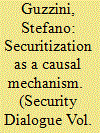

|
|
|
|
|
| Publication |
2011.
|
| Summary/Abstract |
The article seeks to offer a way forward in discussions about the status of securitization theory. In my reading, this debate has been inhibited by the difficulty of finding an appropriate version of 'understanding/explanation' that would be consistent with the meta-theoretical commitments of a post-structuralist theory. By leaving 'explanation' and/or all versions of causality to the positivist other, the Copenhagen School also left its own explanatory status often implicit, or only negatively defined. Instead, the present article claims that the explanatory theory used in securitization research de facto relies on causal mechanisms that are non-positivistically conceived. Using the appropriate methodological literature renders this explanatory status explicit, exposing the theory's non-positivist causality and thus, hopefully, enhancing its empirical theory.
|
|
|
|
|
|
|
|
|
|
|
|
|
|
|
|
| 10 |
ID:
109593
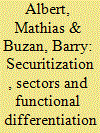

|
|
|
|
|
| Publication |
2011.
|
| Summary/Abstract |
So far, securitization analysis has proceeded on the basis of an assumption that there are sectoral differences between securitization dynamics. However, sectors in this context were primarily seen as analytical 'lenses', as complexity-reducing cuts through a complex social reality. In this article, we first reflect on the ontological status of 'sectors'. Do they represent functionally differentiated realms of world politics or world society, or do sectors and functional realms need to be separated from one another clearly? After giving a short introduction to the notion of 'functional differentiation' in international relations and briefly reflecting on the ontological/analytical distinction, we scrutinize the relation between sectors and functionally differentiated realms of society. Although sectors hang together with functional differentiation, much depends on the version of functional differentiation theory used. In the communication theoretical version, securitization would be firmly located within the political system. References to functionally specific sectors would then - contra Waltz - point not only towards functional differentiation between the political and other functionally defined realms of (international) society, but also towards ongoing functional differentiation within the (international) political system.
|
|
|
|
|
|
|
|
|
|
|
|
|
|
|
|
| 11 |
ID:
109588
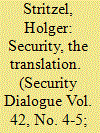

|
|
|
|
|
| Publication |
2011.
|
| Summary/Abstract |
This article confronts the basic idea of securitization with the concept of translation. By critically examining Wæver's deliberately traditionalist and essentialist conceptualization of security and his notion of a distinctly speech-act-theoretical approach to securitization, it develops a processual refinement that reads articulations of security as translations. I claim that this conceptual transposition has the potential to open the current securitization discourse to an alternative perspective and to new avenues of research on the travel, localization and/or gradual evolution/transformation of security meanings.
|
|
|
|
|
|
|
|
|
|
|
|
|
|
|
|
| 12 |
ID:
109590
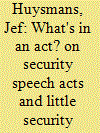

|
|
|
|
|
| Publication |
2011.
|
| Summary/Abstract |
This article makes a claim for re-engaging the concept of 'act' in the study of securitization. While much has been written about the discursive and communicative aspects of securitizing, the concept of 'act' that contains much of the politicality of the speech-act approach to security has been relatively ignored. The task of re-engaging 'acts' is particularly pertinent in the contemporary context, in which politically salient speech acts are heavily displaced by securitizing practices and devices that appear as banal, little security nothings. The main purpose of the article is to begin the framing of a research agenda that asks what political acts can be in diffuse security processes that efface securitizing speech acts.
|
|
|
|
|
|
|
|
|
|
|
|
|
|
|
|
|
|
|
|
|